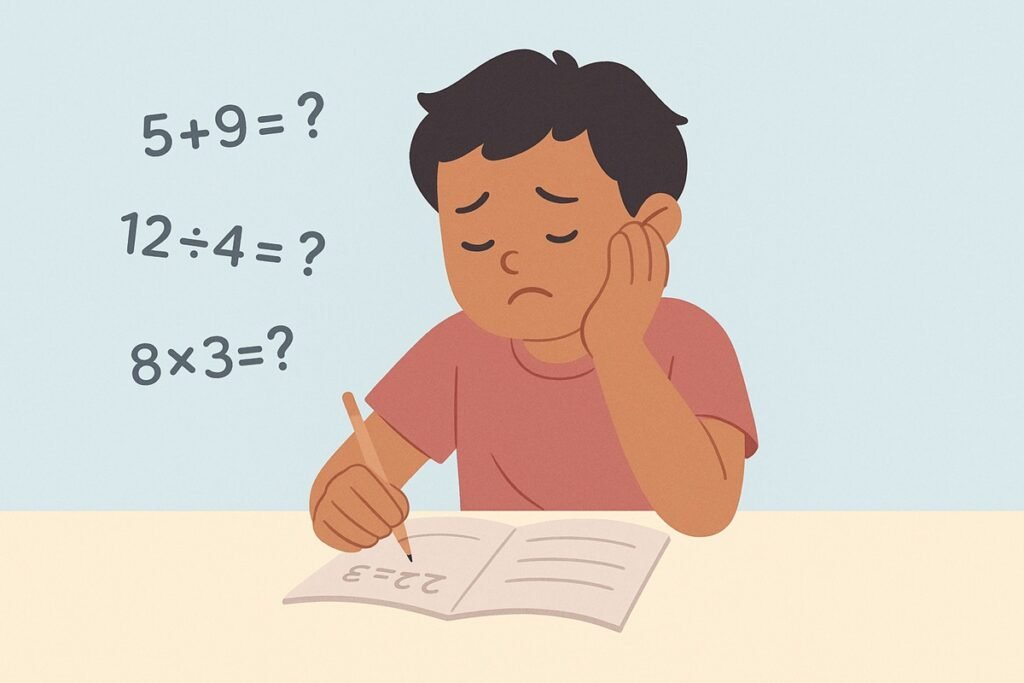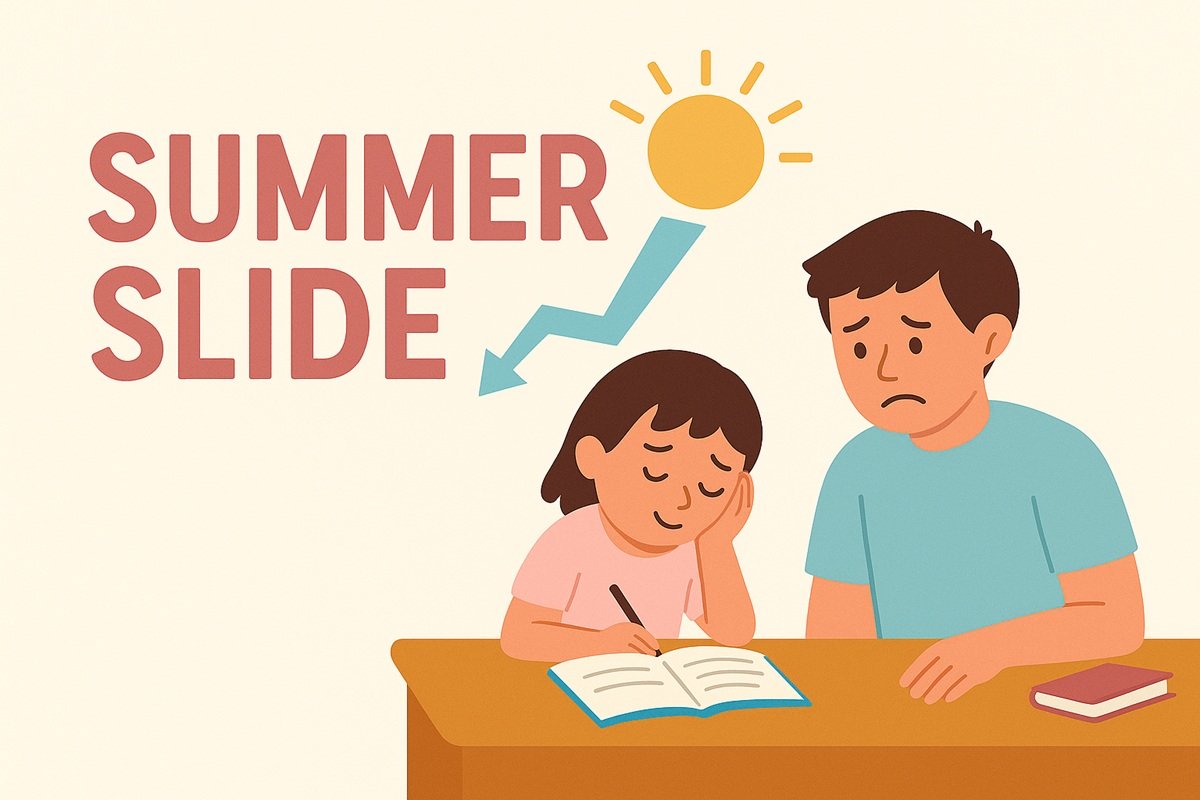As the school year is quickly coming to an end, parents are beginning to plan how to keep their children engaged during the long summer months. While summer break offers a well-deserved respite from the structured school environment, it also presents a concerning educational challenge known as the summer slide.
As a mom of two boys who has navigated 12 summers of parenting, I understand the delicate balance between letting kids enjoy their break and maintaining the academic skills they’ve worked so hard to develop throughout the school year. According to research – and based on my own experience – children can lose significant academic ground during summer vacation, setting them back when school resumes in the fall.
In this guide, I’ll explain what summer slide is, discuss who’s most at risk, and share practical, parent-tested strategies to prevent summer learning loss without overwhelming your child or turning summer into an extension of the school year. These approaches incorporate fun, learning, and relaxation to ensure your child returns to school ready to build on their previous knowledge rather than spending valuable time relearning forgotten skills.
Ready to discover how you can make this summer both enjoyable and educationally enriching for your child?
Let’s dive in:
Disclosure: This post contains affiliate links. As an Amazon Associate, I earn from qualifying purchases. I may earn a commission if you click and make a purchase, at no extra cost to you.
Table of Contents
What Is the Summer Slide?
Summer slide, also known as summer learning loss or summer setback, refers to the decline in academic knowledge and skills that many children experience during the summer break. This phenomenon occurs when students step away from the consistent, structured learning environment of the classroom for an extended period without engaging in educational activities.
During the school year, children benefit from daily instruction, practice, and review of concepts across various subjects. When this routine abruptly ends with summer vacation, many children don’t engage with academic material for weeks or months. Without regular reinforcement, previously learned information can fade from memory, especially skills that require consistent practice like reading and mathematics.
The brain works much like a muscle – when it is not exercised regularly, it loses strength in specific areas. Educational neuroscience research shows that neural connections that aren’t regularly activated become weaker over time, making it more difficult to access and use this knowledge when students return to school.
It’s important to understand that summer slide isn’t the result of poor teaching, bad parenting styles, or a child’s inability to learn. Instead, it’s a natural cognitive process that affects learners of all abilities when they disengage from academic content for extended periods.
Summer Slide Statistics

The research on summer learning loss (SLL) paints a concerning picture for parents and educators alike. Typically, students experience a decline in achievement scores over summer vacation by approximately one month’s worth of school-year learning, with steeper declines in math than reading, according to a meta-analysis published in the Review of Educational Research. Recent research by the NWEA also confirms that the summer slide is significantly more pronounced in math than in reading though both suffer during the summer months.
A large-scale study published in the American Educational Research Journal found that over the course of 5 years, 52% of students lost an average of 39% of their total school year learning gains over the summer months each year.
The good news is that being aware of this phenomenon puts you – the parent – in a position to help prevent it. By implementing some simple, enjoyable strategies during the summer months, you can help your child maintain and even strengthen their academic skills without turning summer into an extension of the school year.
Who Is Most at Risk of Summer Learning Loss?
While the summer slide can affect all children, research indicates that certain groups are particularly vulnerable to more significant learning losses during summer break.
Children from lower-income households might experience steeper declines in reading and math skills compared to their more affluent peers though there is no widespread agreement on that among experts. Earlier research from Johns Hopkins University suggested that summer learning loss accounts for about two-thirds of the 9th grade achievement gap between low-income and high-income students, but more recent studies have questioned this finding. Indeed, the Brookings Institution reports that contrary to earlier beliefs, recent data does not support the notion that summer test score drops are concentrated among low-income students. If there is such disparity, it is partly attributed to differences in access to books, educational resources, enrichment activities, and academically stimulating environments, such as summer camps, during summer months.
Younger students, particularly those in elementary school, typically experience more pronounced learning loss than older students, as reported by the NWEA. This is because younger children are still developing fundamental skills like reading fluency and basic math operations, which require consistent practice to master. Without regular reinforcement, these budding skills can regress more quickly.
Students who are already struggling academically often face greater setbacks during summer. Research suggests that children who are below grade level when summer begins are more likely to fall further behind compared to their peers who are performing at or above grade level.
Children with learning differences or disabilities sometimes experience more pronounced summer learning loss. Students with learning challenges often benefit from consistent routines and specialized instructional approaches that might not be maintained during summer months.
Understanding these risk factors can help you tailor your approach to preventing summer slide based on your child’s specific needs. Regardless of which group your child might fall into, the strategies in the next section can be adapted to help maintain and even strengthen their academic skills during the summer months.
How to Prevent the Summer Slide
Preventing summer slide doesn’t mean transforming your home into a summer school or sacrificing the joy and relaxation that summer break should bring. Instead, it’s about finding a balance that incorporates learning naturally into summer activities.
Here are a few effective strategies that maintain academic skills while still allowing your child to enjoy their well-deserved break:
1. Make Reading a Daily Adventure
Reading is perhaps the single most important activity for preventing summer slide. According to research, reading just 4-5 books over the summer can prevent learning loss in reading comprehension.
Practical tips:
- Set aside 20-30 minutes of family reading time each day.
- Visit your local library weekly to keep books fresh and exciting.
- Let your child choose books based on their interests.
- Try audiobooks for car rides or while doing chores.
- Participate in summer reading programs offered by libraries, bookstores, or online platforms.
- Create a cozy outdoor reading spot like a hammock or blanket under a tree.
For younger children, books like The Day the Crayons Quit by Drew Daywalt and The Gruffalo by Julia Donaldson are perfect for summer reading. For older elementary students, series like Dog Man by Dav Pilkey or The Wild Robot by Peter Brown can keep them engaged all summer long.
Personal experience: Both my children love reading books, and it all started by reading books together, which naturally evolved into them reading on their own. Having a daily structure where we read before dinner and then before bed has been crucial in building this love for books.
Additional sources you might find useful:
2. Blend Math Into Everyday Activities
Math skills tend to decline more rapidly than reading skills during summer months. Fortunately, everyday activities provide numerous opportunities to practice math naturally.
Practical tips:
- Cook together, measuring ingredients and discussing fractions.
- Play board games that involve counting, strategy, and probability.
- Create a lemonade stand to practice money skills and basic economics.
- Go grocery shopping and have your child compare prices or calculate discounts.
- Plant a garden and measure growth, calculate area, and track patterns.
- Use apps like Prodigy, Khan Academy Kids, or Bedtime Math for fun math practice.
Personal experience: When my friend’s son was struggling with multiplication facts after third grade, they created a “Math Minute” challenge each morning during breakfast. Just that brief, consistent practice maintained his skills and boosted his confidence when school resumed.
3. Explore Summer Learning Programs

Many organizations offer programs specifically designed to prevent summer slide while keeping learning fun and engaging. These organized summer activities for kids can truly help you avoid the summer learning loss.
Practical tips:
- Look for half-day camps or programs that focus on STEAM activities.
- Check with your school district for summer enrichment opportunities.
- Investigate online programs like Khan Academy’s summer learning challenges.
- Consider weekly classes in areas of interest like coding, robotics, or art.
Remember that the most effective summer programs balance structured learning with hands-on activities and plenty of time for play and social interaction. High-quality summer programs that run for at least five weeks can not only prevent learning loss but actually lead to gains in math and reading.
Personal experience: Over the last few summers, my kids and I have been traveling to Bulgaria, where I am from, to spend time with my parents. Partially to allow me to continue my freelance work during the summer and partially to prevent the summer slide, I’ve been signing up my boys for summer school, where they get a chance to polish their Bulgarian reading and writing skills. Honestly, I’ve been surprised by how happy both of them are to attend whole-day classes to learn Bulgaria, make new friends, and play outside.
4. Create a Literacy-Rich Environment
Beyond dedicated reading time, you can foster literacy throughout the day by creating an environment that encourages reading and writing.
Practical tips:
- Label items around the house for younger children.
- Leave notes for your child and encourage them to write back.
- Create a summer journal or scrapbook to document activities.
- Start a family blog or newsletter.
- Play word games like Scrabble, Bananagrams, or verbal games like 20 Questions during car rides.
- Tell stories together, taking turns adding elements to the narrative.
Personal experience: As someone who grew up surrounded by hundreds of books both at home and in the homes of my grandparents, it was crucially important for me to create the same environment for my children. Simply seeing all these books around you and reading the titles and the names of the authors sparks curiosity and makes you want to get big enough to be able to read them and understand them.
5. Embrace Educational Screen Time
While limiting overall screen time is important, educational technology can be a valuable tool for preventing summer slide when used thoughtfully.
Practical tips:
- Schedule specific times for educational apps and programs.
- Preview content to ensure it’s age-appropriate and genuinely educational.
- Participate with your child when possible to make it interactive.
- Balance screen-based learning with physical activities.
- Look for apps and programs that adapt to your child’s skill level and provide feedback.
Quality educational resources include PBS Kids games, National Geographic Kids, BrainPOP, and specific subject-based apps like Epic! for reading or Dreambox for math.
Personal experience: While I try to limit screen time for my two boys, I allow a couple of hours a day in the summer for educational content. National Geographic has been a major hit for my kids.
6. Take Learning on the Road
Summer trips and outings provide rich opportunities for experiential learning that reinforce academic skills while creating memorable experiences.
Practical tips:
- Visit museums, science centers, historical sites, and nature preserves.
- Create scavenger hunts that incorporate reading, math, or science concepts.
- Listen to educational podcasts during road trips.
- Collect and read brochures about places you visit.
- Have your child research destinations before you go.
- Encourage your child to keep a travel journal.
Experiential learning opportunities during summer can significantly impact academic retention and motivation to learn.
Personal experience: While we visit Bulgaria for the summer, we always organize a couple of trips to historical sites and local museums to incorporate learning into traveling.
7. Establish a Gentle Summer Routine
While summer should feel different from the school year, maintaining a loose structure helps children thrive and makes it easier to incorporate learning seamlessly. You can easily incorporate this into your gentle parenting style.
Practical tips:
- Create a visual schedule that includes both learning activities and plenty of free time.
- Designate a consistent morning or afternoon period for quiet learning activities.
- Balance structured activities with unstructured play.
- Be flexible – learning can happen anywhere and doesn’t need to follow a rigid schedule.
- Include your child in planning their summer routine.
Personal experience: In our family, we follow the morning magic approach – we handle learning activities in the morning when minds are fresh, leaving afternoons free for swimming, playdates, and unstructured fun.
8. Connect With Teachers
Your child’s teachers can be valuable resources for preventing summer slide.
Practical tips:
- Ask for summer learning suggestions specific to your child before the school year ends.
- Inquire about areas where your child might need extra support.
- Look into teacher-recommended resources and activities.
- Check if the school provides summer learning packets.
- If your child has any learning differences, discuss how to maintain accommodations at home.
Teachers often have insights about your specific child’s needs that generic summer programs might miss, so it’s worth asking them for advice before the summer starts.
Personal experience: My kids’ school always hands out summer packages with a range of language exercises and math problems that help them maintain their knowledge and skills during the vacation.
Final Thoughts
Summer slide is a real phenomenon that affects millions of children each year, but with awareness and thoughtful planning, you can help your child maintain and even strengthen their academic skills without sacrificing the joy and freedom that summer break should bring.
The key is balance – interweaving learning naturally into summer fun rather than creating a rigid academic schedule. By making reading a daily adventure, blending math into everyday activities, exploring quality summer programs, creating a literacy-rich environment, embracing educational technology, taking learning on the road, establishing gentle routines, and connecting with teachers, you can effectively prevent summer learning loss.
Remember that preventing summer slide isn’t about replicating the school environment at home. It’s about fostering a love of learning that extends beyond the classroom walls and throughout the year. When children see learning as a natural, enjoyable part of daily life rather than something that only happens at school, they develop the intrinsic motivation that leads to lifelong learning.
How does your family balance summer fun with learning? What activities have you found most effective in preventing summer slide without overwhelming your children? I’d love to hear your experiences and suggestions as we build our virtual village of parents supporting each other through the joys and challenges of raising our children.
Let’s make this summer one where our children not only maintain their academic skills but also discover the joy of learning that extends far beyond the classroom!


